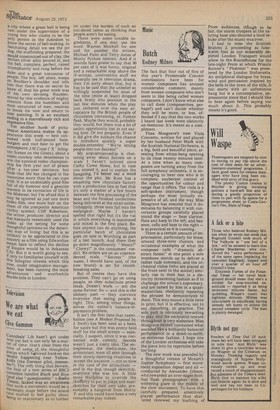Music
Butch
Rodney Milnes
The fact that four out of five of this year's Promenade Concert commissions have been for women composers has aroused considerable comment, mainly from women composers who don't seem to like being called women composers. I don't know what else to call them (composerines, perhaps?) and can't decide whether they will be more, or less, offended if I say that the two works I heard last week were distinctly un-feminine. It's meant as a compliment.
Thea Musgrave's new Viola Concerto, written for and played by her husband Peter Mark with the Scottish National Orchestra, is a big, bold and beautiful piece, arresting from whizz-bang opening to its close twenty minutes later. At a time when so many composers are turning away from the full symphony orchestra, it is encouraging to hear one who is in complete, exuberant control of the opportunities for colour and range that it offers. The viola is a soft-spoken instrument, though perhaps the most lyrically expressive of all, and the way Miss Musgrave has ensured that it dominates by balancing it with concertante groups carefully placed round the stage — bass clarinet, flute and harp to the left, and bassoon, cello and bass to the right — is as practical as it is cunning.
There is a certain amount of improvisation, particularly for brass, around three-note clusters, and occasional examples of what the composer calls " dramatic abstract forms;" at one point a solo trombone stands up to deliver a rather rude comment, and the orchestral violas (who are placed at the front next to the soloist) similarly rise to their feet in a distinctly threatening fashion as if to challenge the soloist's supremacy, and are tamed by him in a quasimasterclass, obediently repeating the phrases he demonstrates to them. This may sound a little twee in print, but it is effective, not to say disturbing, in practice. The solo part is obviously rewarding to play, and the orchestral texture throughout is very elaborate. Miss Musgrave herself conducted what sounded like a brilliantly balanced performance in a down-to-earth, no-nonsense fashion. I hope one of the London orchestras will take the piece into its repertoire before too long.
The new work was preceded by a thoughtful version of Mozart's Jupiter Symphony — first movement exposition repeat and all — conducted by Alexander Gibson, who rewarded an over-eager Scot Nat flash photographer with a withering glare in the middle of the slow movement. To have this carefully prepared, attentively played performance thus shattered renewed my loathing of Prom audiences, thOugh to be fair, the storm troopers at the saluting base also shouted a loud rebuke after the music was over.
I had to miss the Scottish Brahms 2, proceeding as lukewarm foot as our miserably depleted London Transport would allow to the Roundhouse for the late-night Prom at which Priaulx Rainier's " Ploermel " was premiered by the London Sinfonietta. An antiphonal dialogue for brass, wind and percussion inspired by the bells in the town of the title, it too starts with an unfeminine bang but is a contemplative, impressionist piece that I should like to hear again before saying too much about it. This probably means it's good.
_.


































 Previous page
Previous page